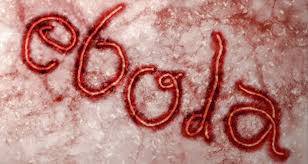Ebola is a slow starter; it creeps into the body and attacks the immune system. It targets the same cells as the AIDS virus (T-Lymphocyte cells) but Ebola is much more aggressive and munches its way through all kinds of immune cells at an alarming rate.
The only things Ebola doesn't attack are bones and skeletal muscle.
The very first symptoms of Ebola are very similar to many other things, so it's important not to panic if you have symptoms that match these:

The very first symptoms of Ebola are very similar to many other things, so it's important not to panic if you have symptoms that match these:
It usually starts with a high fever, bad headaches, joint and muscular pain. Patients usually find that they get a sore throat and are less likely to want to eat.
When Ebola targets the collagen in our bodies, the real problems start because collagen is like a glue, and it keeps our organs in the right place. When Ebola eats away at it, the top layer of skin effectively floats on liquid resulting in small white blisters and red spots that can tear apart with very little pressure.
The skin can rip, and bleeding can begin spontaneously from eyes, nose, mouth and other orifices. At the same time, clots are forming in the blood vessels, and they begin to leak preventing blood reaching the major organs of the body. This of course, causes them to shut down.
While all this is going on inside the body, the patient will be having bouts of vomiting and diarrhoea both of which will be filled with more and more blood each time.
The disease becomes terminal when the immune system begins to attack the body. The patient will develop large blood blisters, and their eyes will become red. Blood begins to pour from the body triggering shock as the organs shut down one by one.
When Ebola targets the collagen in our bodies, the real problems start because collagen is like a glue, and it keeps our organs in the right place. When Ebola eats away at it, the top layer of skin effectively floats on liquid resulting in small white blisters and red spots that can tear apart with very little pressure.
The skin can rip, and bleeding can begin spontaneously from eyes, nose, mouth and other orifices. At the same time, clots are forming in the blood vessels, and they begin to leak preventing blood reaching the major organs of the body. This of course, causes them to shut down.
While all this is going on inside the body, the patient will be having bouts of vomiting and diarrhoea both of which will be filled with more and more blood each time.
The disease becomes terminal when the immune system begins to attack the body. The patient will develop large blood blisters, and their eyes will become red. Blood begins to pour from the body triggering shock as the organs shut down one by one.